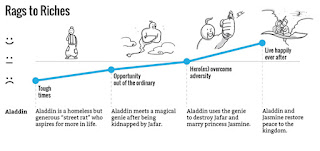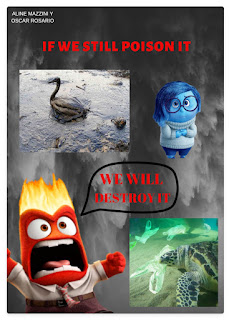https://www.youtube.com/watch?v=qDwX63jSowc
Blog for English as a Foreign Language Students and Teachers who want to get some ideas and exercises for their classes.
2 Dec 2019
3ESO: Meet Spanish Snowboarding Prodigy - Queralt Castellet
LISTENING: Meet Spanish Snowboarding Prodigy - Queralt Castellet 2013
https://www.youtube.com/watch?v=qDwX63jSowc
https://www.youtube.com/watch?v=qDwX63jSowc
29 Nov 2019
1BAC Contrasting ideas
Etiquetas:
1BAC,
although,
CONNECTORS,
contrast,
despite,
in spite of,
though
25 Nov 2019
2BAC. Crime vocabulary L2L
Choose options A or Bboth for CONTENT and for the METHOD
(COMPETENCE: LEARNING TO LEARN [L2L]):
CONTENT
CONTENT-OPTION A: Vocabulary
https://www.engvid.com/english-resource/vocabulary-crime-criminals/
CONTENT-OPTION B:
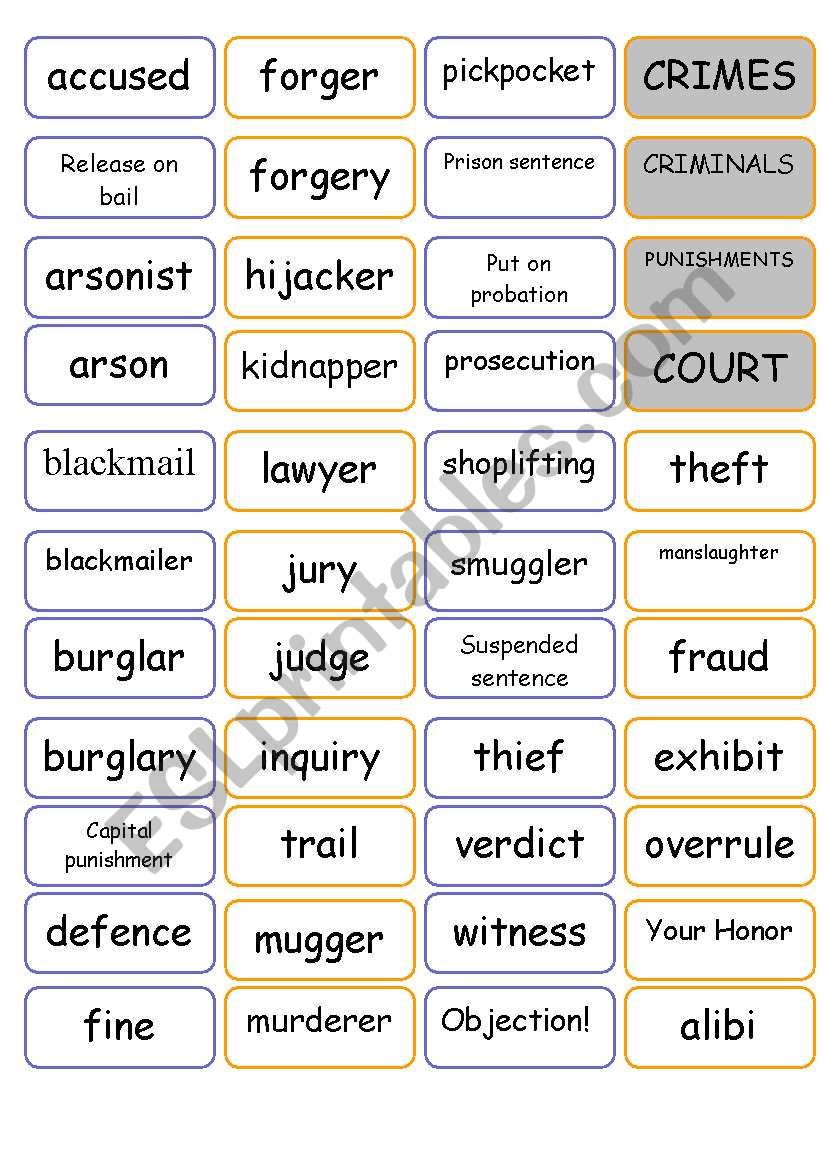
METHOD:
METHOD- OPTION A:
Have a look to this list: can you organize it in a spider web / mind map according to their classification? (Linke them accordingly E.g. Category: burglar, burglary... break into). You can use this page to create yours, copy and paste your image and add it to your personal learning portfolio:
http://mindmapfree.com/
METHOD- OPTION B: You can use these instructions to create it in a Word document:
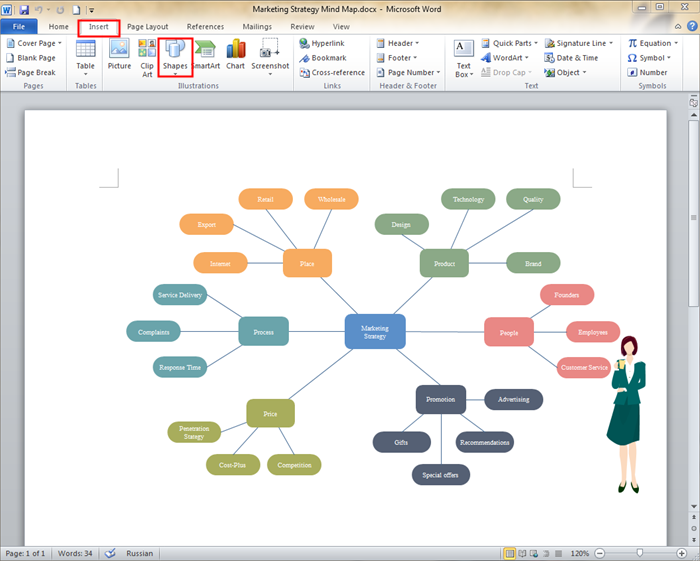
https://www.edrawsoft.com/mindmap/create-a-mind-map-on-microsoft-word.php
EXTRA:
Quizz
https://www.eltbase.com/quiz/6000_49.htm
Crosswords
https://www.eltbase.com/quiz/348_01.htm
https://www.eltbase.com/quiz/348_02.htm
ONLINE GAMES
http://www.detective-games.online/crime_investigation_games.html
4 Nov 2019
2BAC: News, news!

Copy the parts of a piece of news on your notebook. Then choose a piece of news and:
1- Identify its parts
2- Answer the wh- questions and comment on their order (pyramid)
3- Make a summary
4- Finally, write an article about a current issue in you area. You can work in pairs. Add a picture and caption and use the journalist techniques worked in class.

INVERTED PYRAMID: AN EXAMPLE

ACTIVITY: NARRATIVE TENSES (UPPER-INTERMEDIATE)
http://www.bbc.co.uk/learningenglish/course/upper-intermediate/unit-26/session-1

22 Oct 2019
2BAC: Punctuation

Remember how important it is to use punctuation correctly...
Let's eat children... is not quite the same as Let's eat, children!
You are about to start university or higher education next year, so it is important to mind your punctuation. Follow these exercises, read the usage and common mistakes and put them into practice in your compositions. Learn the names of each symbol!

Theory:
https://www.bristol.ac.uk/arts/exercises/grammar/grammar_tutorial/index.htm
Including capital letters: https://www.english-at-home.com/business/improving-your-punctuation/
Practice:
TEST: https://www.niu.edu/writingtutorial/punctuation/quizzes/PunctuationSelfTest.htm
Exercises: http://www.butte.edu/departments/cas/tipsheets/practice_punctuation.html
Did you know that this was the shortest message exchange ever?
15 Oct 2019
BACHILLERATO: Stories... elements and plots
https://poestories.com/read/blackcat
Halloween is coming and this is the proposed reading for this October, a short story by Edgar Alan Poe... Enjoy it!
If you want more... Keep reading: a haunting story like Ligeia...
https://poestories.com/read/ligeia
Or the famous Crimes in the Rue Morgue...
https://poestories.com/read/murders
Elements in a story:
Have a look to these diagrams... what register are they using? And what level of language? What metaphors are they using? Can you apply it to a fairy tale? And to Poe's short stories? Are there more tipes of plot?
Halloween is coming and this is the proposed reading for this October, a short story by Edgar Alan Poe... Enjoy it!
If you want more... Keep reading: a haunting story like Ligeia...
https://poestories.com/read/ligeia
Or the famous Crimes in the Rue Morgue...
https://poestories.com/read/murders
Elements in a story:
Have a look to these diagrams... what register are they using? And what level of language? What metaphors are they using? Can you apply it to a fairy tale? And to Poe's short stories? Are there more tipes of plot?
14 Oct 2019
7 Oct 2019
HISPANIC CELEBRATION DAY: Christopher Columbus, a biography (Simple Past)
 (A)
Christopher Columbus (before 31 October 1451 – 20 May 1506) 1.
______ (be) an Italian explorer,
navigator, and colonist who 2.______________
(complete) four
voyages across the Atlantic Ocean under the auspices of
the Catholic Monarchs of
Castile and Aragon. He 3.__________ (lead) the first European expeditions to
the Caribbean, Central
America, and South America,
initiating the permanent European
colonization of the Americas. Columbus 4.______________ (discover) a
viable sailing route to the Americas, a continent that was then unknown to
the Old World. While what he 5._________
(think) he had discovered was a route to
the Far East, he is credited with the opening of the Americas for conquest and
settlement by Europeans.
(A)
Christopher Columbus (before 31 October 1451 – 20 May 1506) 1.
______ (be) an Italian explorer,
navigator, and colonist who 2.______________
(complete) four
voyages across the Atlantic Ocean under the auspices of
the Catholic Monarchs of
Castile and Aragon. He 3.__________ (lead) the first European expeditions to
the Caribbean, Central
America, and South America,
initiating the permanent European
colonization of the Americas. Columbus 4.______________ (discover) a
viable sailing route to the Americas, a continent that was then unknown to
the Old World. While what he 5._________
(think) he had discovered was a route to
the Far East, he is credited with the opening of the Americas for conquest and
settlement by Europeans.
(B) Columbus's early life is
somewhat obscure, but scholars generally agree that he was born in the Republic of Genoa and 6.______________
(speak) a dialect of Ligurian as
his first language. He 7. ___________ (go) to sea at a young age and 8.___________
(travel) widely, as far north as the British Isles (and possibly Iceland) and
as far south as what is now Ghana. He 9.____________
(marry) a Portuguese noblewoman Filipa Moniz Perestrelo and they 10._________ (be) based in Lisbon for several years, but later took
a Castilian mistress; he 11.____________ (have) one son with each woman. Though
largely self-educated, Columbus 12.___________ (read) a lot of geography,
astronomy, and history. He 13.____________ (formulate) a plan to seek a western
sea passage to the East
Indies, hoping to profit from the lucrative spice trade.
(C) After Columbus lobbied them for years, the Catholic Monarchs
of Castile and Aragon agreed to
sponsor a journey west, in the name of the Crown of Castile. Columbus 14.____________
(leave) Castile in August 1492 with three ships, la Pinta, la Niña and la Santa
María, and after a stopover in the Canary
Islands, he 15.__________ (make) landfall in the Americas on 12
October (now celebrated as Columbus
Day). His landing place 16._____ (be) an island in the Bahamas: its native
inhabitants 17._________ (know) it as Guanahani; its exact location is uncertain.
Columbus also 18._______________ (visit) Cuba and Hispaniola, and 19._______________
(establish) a colony in what is now Haiti.
He 20.____________ (arrive) back in Castile in early 1493, and he 21._____________
(bring) a number of vegetables with him: cocoa, potatoes, tomates, etc. Word of his discoveries soon
22._____________ (spread) throughout Europe.
(D) Columbus 23.___________ (make) three further voyages to the New World, exploring the Lesser Antilles in 1493, Trinidad and the northern coast of South America in 1498, and the eastern coast of Central America in 1502. Many of the names he 24.__________ (give) to geographical features—particularly islands—are still in use. He 25.____________ (continue) to seek a passage to the East Indies, and the extent to which he was aware that the Americas 26.____________ (be) a wholly separate landmass is uncertain; he 27.__________ (give) the name indios ("Indians") to the indigenous peoples he 28.______________ (encounter).
(E) Columbus's expeditions 29._____________ (inaugurate) a
period of exploration, conquest, and colonization that 30._____________ (last)
for centuries, and he 31.____________ (help) create the modern Western
world. The transfers between the Old World and New World that
32.______________ (follow) his first voyage are known as the Columbian exchange, and historians 33.___________
(name) the period of human habitation in the Americas prior to his arrival... the Pre-Columbian era.
Adapted from Wikipedia
a) How many
voyages ______ Columbus complete? _____
b) How many children ____ he have? ____
c) How many ships ____ he take on his first voyage? _____
d) When ____ he first
depart? _____
e) What period ___ he inaugurate? Medieval/modern/contemporary age
EXTRA: DO YOU KNOW...Which city did he depart
from in Spain?
23 Sept 2019
BACH. Climate Week + Present tenses (Present S. & Cont. + Present Prefect S. & Cont.). We have been polliting for a long time...
Let's watch this report. Make 6 questions to your classmates (6 Ws). E.g. Where does it take place?
Now have a look to these pictures.

STAND FOR: refuse to endure or tolerate.
STAND ON: be scrupulous in the observance of.
Read the messages and identify the vocabulary, phrasal verbs and puns! Then start thinking your own to create them :)




Every Friday many students demonstrate against global warming and climate change in the world. The fact is that we have been polluting our planet for a long time and currently the Earth has reached one of the highest temperatures in a long time. What can we do to solve this problem? Look at this initiative!This week many schools are celebrating the Climate Week with several activities to be carried out every day. Have a look to the poster and comment on these ideas. Are you upo for the challenge?

- Can you identify the four tenses in bold present in the text?
- When do we use them?
- What expressions can help us identify them?
TEACHERS & STUDENTS FOR CLIMATE!
Look at the poster: these are some ideas Spanish schools are going to develop for the week. Can youprovide more ideas? And adapt this poster into Englih in your notebook? We can also display a big one in class or at school!
Try this text about Global Warming using present tenses
https://www.english-grammar.at/online_exercises/tenses/t054-global-warming.htm
Drilling exercises:
Present simple or continuous?
https://www.english-grammar.at/online_exercises/tenses/present_simple_progressive1.htm
https://www.english-grammar.at/online_exercises/tenses/t127-present-tense.htm
Present perfect
https://www.englisch-hilfen.de/en/exercises/tenses/present_perfect_or_progressive.htm
https://www.englisch-hilfen.de/en/exercises/tenses/present_perfect_statements.htm
https://www.englisch-hilfen.de/en/exercises/tenses/present_perfect_negation.htm
https://www.englisch-hilfen.de/en/exercises/questions/present_perfect2.htm
https://www.englisch-hilfen.de/en/exercises/tenses/present_perfect_mix.htm
Create your posters!
Make groups and design your poster. You can take the ideas you worked out last year (deforestation, recycling, saving energy or water...). You can use the apps below. Try to combine powerful images and witty messages (rhyme and puns are a plus!). Then share them and explain them in class. We will hang them out at school this Friday.
https://piktochart.com/formats/posters/
https://www.canva.com/create/posters/
Which SDG are we working on?
*SDG: Sustainalble Development Goals /ODS: Objetivos de Desarrollo Sostenible
YOUR POSTERS: CONGRATULATIONS! GOOD JOB!!
17 Sept 2019
1BAC: Phonetics - Vowels and simple vocabulary transcription
How many vowels are there in the Spanish system? And in Catalan? Today we will discover how many there are in the English vowel system.
DEFINITION: A vowel is a syllabic speech sound pronounced without any stricture in the vocal tract. Vowels are one of the two principal classes of speech sounds, the other being the consonant. Vowels vary in quality, in loudness and also in quantity (length).
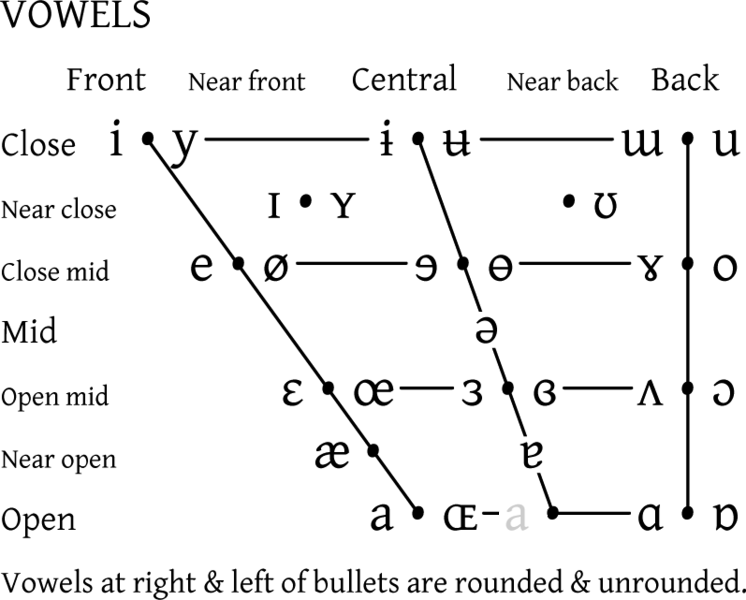
This is the general IPA (International phonetic chart) for vowels. Which ones can you recognise? If you are curious to know how do they ALL of them sound, watch this: https://www.youtube.com/watch?v=6UIAe4p2I74
Now, compare, and add the ones in Catalan (and French and Portuguese if you dare!):

Interactive chart:
http://cambridgeenglishonline.com/interactive_phonemic_chart/
VOWELS: I, A, O
Try your knowledge! Use your earphones and do your best! You can try NEW tests (button):
1) Sounds for I (short/long) : https://www.englisch-hilfen.de/en/exercises/pronunciation4/index.php
2) Sounds for A: https://www.englisch-hilfen.de/en/exercises/pronunciation2/index.php
3) Sounds for O: https://www.englisch-hilfen.de/en/exercises/pronunciation5/index.php
VOCABULARY: what is the word?
4) Animals: https://www.englisch-hilfen.de/en/exercises/languages/phonetic-transcription-animals.htm
5) Clothes: https://www.englisch-hilfen.de/en/exercises/languages/phonetic-transcription-clothes.htm
6) Body: https://www.englisch-hilfen.de/en/exercises/languages/phonetic-transcription-body.htm
7) Family: https://www.englisch-hilfen.de/en/exercises/languages/phonetic-transcription-family.htm
8) House: https://www.englisch-hilfen.de/en/exercises/languages/phonetic-transcription-house.htm
9) Character: https://www.englisch-hilfen.de/en/exercises/languages/phonetic-transcription-character.htm
10) Fruit: https://www.englisch-hilfen.de/en/exercises/languages/phonetic-transcription-fruit.htm
EXTRA:
If you found it hard. try these EASY ones:
11) Numbers: https://www.englisch-hilfen.de/en/exercises/languages/phonetic-transcription-numbers.htm
12) Colours: https://www.englisch-hilfen.de/en/exercises/languages/phonetic-transcription-colours.htm
If you found it easy, try these HARDER ones:
11') Vegetables: https://www.englisch-hilfen.de/en/exercises/languages/phonetic-transcription-vegetables.htm
12') Bathroom: https://www.englisch-hilfen.de/en/exercises/languages/phonetic-transcription-bathroom.htm
Soon there will be new categories: DIPHTONGS, CONSONANTS, STRESS, INTONATION...
DEFINITION: A vowel is a syllabic speech sound pronounced without any stricture in the vocal tract. Vowels are one of the two principal classes of speech sounds, the other being the consonant. Vowels vary in quality, in loudness and also in quantity (length).

This is the general IPA (International phonetic chart) for vowels. Which ones can you recognise? If you are curious to know how do they ALL of them sound, watch this: https://www.youtube.com/watch?v=6UIAe4p2I74
Now, compare, and add the ones in Catalan (and French and Portuguese if you dare!):

Interactive chart:
http://cambridgeenglishonline.com/interactive_phonemic_chart/
VOWELS: I, A, O
Try your knowledge! Use your earphones and do your best! You can try NEW tests (button):
1) Sounds for I (short/long) : https://www.englisch-hilfen.de/en/exercises/pronunciation4/index.php
2) Sounds for A: https://www.englisch-hilfen.de/en/exercises/pronunciation2/index.php
3) Sounds for O: https://www.englisch-hilfen.de/en/exercises/pronunciation5/index.php
VOCABULARY: what is the word?
4) Animals: https://www.englisch-hilfen.de/en/exercises/languages/phonetic-transcription-animals.htm
5) Clothes: https://www.englisch-hilfen.de/en/exercises/languages/phonetic-transcription-clothes.htm
6) Body: https://www.englisch-hilfen.de/en/exercises/languages/phonetic-transcription-body.htm
7) Family: https://www.englisch-hilfen.de/en/exercises/languages/phonetic-transcription-family.htm
8) House: https://www.englisch-hilfen.de/en/exercises/languages/phonetic-transcription-house.htm
9) Character: https://www.englisch-hilfen.de/en/exercises/languages/phonetic-transcription-character.htm
10) Fruit: https://www.englisch-hilfen.de/en/exercises/languages/phonetic-transcription-fruit.htm
EXTRA:
If you found it hard. try these EASY ones:
11) Numbers: https://www.englisch-hilfen.de/en/exercises/languages/phonetic-transcription-numbers.htm
12) Colours: https://www.englisch-hilfen.de/en/exercises/languages/phonetic-transcription-colours.htm
If you found it easy, try these HARDER ones:
11') Vegetables: https://www.englisch-hilfen.de/en/exercises/languages/phonetic-transcription-vegetables.htm
12') Bathroom: https://www.englisch-hilfen.de/en/exercises/languages/phonetic-transcription-bathroom.htm
Soon there will be new categories: DIPHTONGS, CONSONANTS, STRESS, INTONATION...
Subscribe to:
Posts (Atom)







